Almost There: Robert De Niro in "Mean Streets"
 Tuesday, April 2, 2024 at 9:00PM
Tuesday, April 2, 2024 at 9:00PM 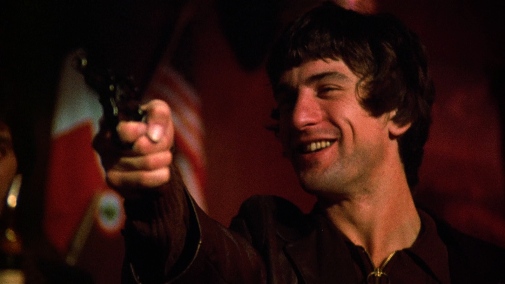
Fifty years ago today, the 46th Academy Awards took place in Los Angeles. It was a starry night, as Oscar nights often are, and The Sting would end the ceremony as its big winner. The Exorcist and The Way We Were also did well for themselves, illustrating a push-and-pull between modernity and tradition as the industry tried to reckon with the nascent Old Hollywood movement within its ranks. Indeed, that same year, an up-and-coming New York-based filmmaker had premiered his third feature to great acclaim. Amid its cast was an actor who'd become one of his most important collaborators, a creative partnership that lasts till today and has shaped a good part of American film history.
Mean Streets was also the first time Robert De Niro entered the Oscar conversation. Critics singled him out for his turn as Scorsese's Johnny Boy…
We first glimpse De Niro's Johnny Boy in the picture's home video introduction. He's one of many faces, towering over Keitel's Charlie when they pose together. His handsomeness catches the eye, as does the smiling levity of his demeanor. Charlie looks concerned, always brooding, but his best friend is something altogether different, more magnetic but also, perchance, more dangerous. The setting is Little Italy in the early 70s, a social milieu where an undercurrent of organized crime taints every interaction, and even the tightest bond can have a transactional twist. In the narrative proper, the camera will follow Charlie rather than his pal, no matter that De Niro is first-billed ahead of Harvey Keitel. It's through Charlie's eyes that we see the world, through the prism of Catholic guilt he carries with him everywhere.
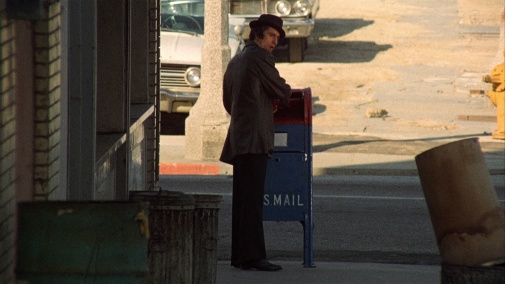
As for Johnny, when we next meet him, the man's walking down the street, failing at looking inconspicuous after planting a bomb on a mailbox. Performance-wise, it's as if De Niro's playing the moment like he's in a stoner comedy ahead of its time – a strategy he'll repeat throughout. All about the physicality, his demeanor immediately leaves a strong impression, which is dramatically necessary for the task at hand. Scorsese's not one for exposition or even that much storytelling. Mostly, Mean Streets is about a specific place and the moral quandaries of one man who sees it as his burden to save another. Logically, the characters must be established, from the onset, what's at stake and what's their deal. It should be plain to see from just a couple of glances, and it is.
But of course, part of it is De Niro's skill, and another part is Scorsese's genius in casting him. The performance blazes with a young actor's eagerness to prove himself, informing the characterization in ways that go beyond dramaturgy. As Pauline Kael said, "the kid doesn't just act – he takes off into the vapors." The viewer can attest that soon enough when Johnny shows up at the neighborhood's nighttime paradise, Tony's bar. He walks in a pants-less jokester, putting on a show for a couple of girls orbiting around him. There's a performative quality to it, but De Niro carries it well, ensuring we get that, for all his posturing, Johnny's a natural show-off. He's the kind of guy who's always the center of attention, a limelight magnet who can't help but be a clown with a killer smile.
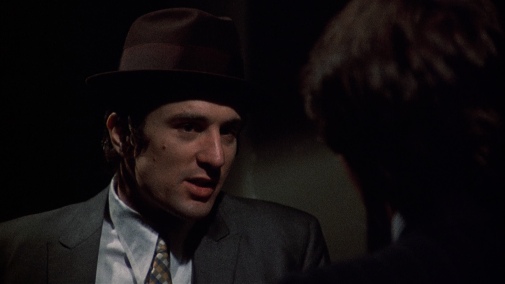
You've met this guy or know someone who has. You know him even if you don't. Charlie certainly knows him and can see right through every shameless lie the old friend throws in front of him. As if to confirm it, when called off on his bullshit, the gum-chewing rascal loses that spark. A shadow of insecurity dims the light of his expression. But he gets back on it after the stumble, finding excuse after excuse for why he keeps taking loans and never pays them back. It's akin to seeing a young stud working himself up through an improv routine. He slips up once and then recovers more electric than before, trying to compensate for that momentary weakness. Whether that's something De Niro consciously brought to Johnny or a truth Scorsese captured from his wannabe star, it doesn't matter.
It lives on screen as a piece of visceral authenticity, so real you can practically smell the stink of flop sweat. He's visceral and upsetting, a cacophony and a screech. Even when the scene's not about him, De Niro demands attention. He adds a nervous buzz to every moment, whether biting his nails or just fidgeting, varying which foot he uses to support his weight or the scale of his step. At times, it's as if De Niro is trying to make drama play as farce, repeating the mailbox dynamic leitmotiv-like. Or that's Johnny holding on to a sunny outlook when everything starts to go wrong. In moments like the bar brawl that breaks out early on, De Niro single-handedly turns Mean Streets into a tragicomedy. Look at him putting on an intimidating pose and see a small boy trying to look tough. It's hilarious if you're paying attention.
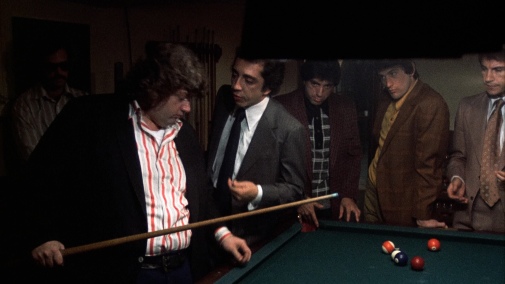
Sometimes, it transcends humor into grotesquerie. Or at least, it does it through Charlie's perspective. As ever, he recognizes every hollow posturing and forced laugh. Yet, there's also affection in his regard, the endearment of a longtime friend whose bond with this impulsive mess of a man is a fact of life, as absolute as the rising sun. Consider them on a troublesome night crawling into dawn, alone in the moonlight. For once, we can see the kid in Keitel, too. Play-fighting with trashcan lids wielded as knightly shields, the two thespians show us the whole history of their characters' friendship, even if its full scope exists mostly off-screen. Finally, at home, they're both too tired to entertain performative nonsense, and even the younger man's bravado has quieted into something closer to candidness. With his oldest friend, he feels safe.
The audience seldom does, however. Somehow, it seems Johnny's constantly accruing more debt when not under Charlie's watchful eye. It comes to a point that whenever he's not on-screen, a nagging feeling starts buzzing in the back of the audience's mind. What is he doing? What kind of trouble is that ne'er-do-well getting himself into, now? As stressful as his presence might be, it's more comforting and comfortable than the alternative. Take, for example, the scene when Charlie's called to see about Johnny, who's found himself alone with a gun on a rooftop nearby. Drunk and belligerent, he's a self-destructive spiral in manly form, hopeless and seemingly unaware of what a pain-in-the-ass he is to friends and family.
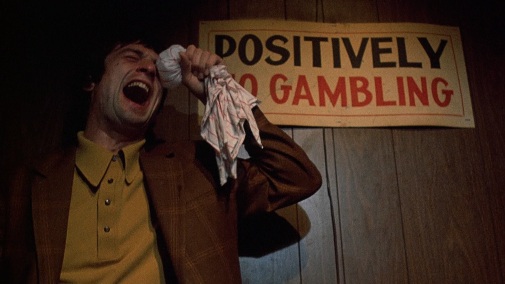
He's a spoiled child and, in that way, an unlikely innocent. It's that bizarre quality that the actor brings and which Charlie latches onto. So does Scorsese and Mardik Martin's guilt-ridden script, for that matter. Protecting Johnny becomes the path to spiritual salvation for the protagonist. However, even at that juncture, De Niro refuses to let his character be reduced to a symbol or thematic mechanism - no matter how much his director might frame him that way, resting on top of a grave. He's always a person first, an infuriating individual, as irrational as so many arrogant young men of his ilk. That multidimensionality permits the escalation in Mean Streets' loose tale. One night, crashing into his best pal's life as he's prone to, Johnny's actually trying to get a rise out of Charlie. The brat continues to act like it's all a game, but his words are more pointed, his attitude a tad more biting.
The black hole inside, that horrible force that sucks the energy out of everyone around him, has started to sip through the laissez-faire façade. When he turns violent on Charlie, you feel something sacred has been broken. The monster is out of the bag, and there's no way to stuff him back in, even as the boldness dies out and leaves behind a crying toddler in the body of a twenty-something. Later, looking in the face of death inflamed with fury and hungry for mob justice, Johnny even dares to laugh. He dares to brandish a pistol as if he's playacting and nothing's too serious. A loose cannon, he's out of control, but De Niro isn't. He never is. To the bitter end, his Johnny is a curse and a reason to live. He's beckoning for salvation and running away from it with every step he takes.
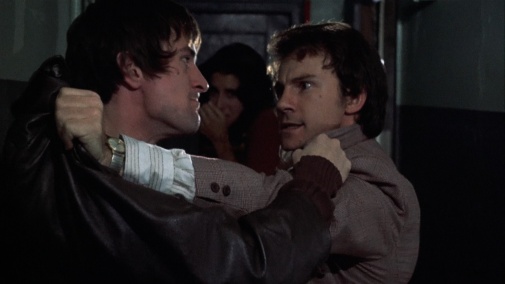
In a time when there weren't nearly as many precursor prizes as there are now, Robert De Niro still managed to snag some honors. The NSFC didn't quite know where to place him, category-wise, so he won the Best Supporting Actor trophy and placed fourth in the race for Best Actor. He also took the former title at the New York Film Critics Circle, tying with himself for his work in Bang the Drum Slowly. He was that year's only acting winner not to get nominated at the Oscars. Instead, AMPAS chose Vincent Gardenia in Bang the Drum Slowly, Jack Gilford in Save the Tiger, John Houseman in The Paper Chase, Jason Miller in The Exorcist, and Randy Quaid in The Last Detail. Houseman took home the little golden man, but De Niro didn't have to wait long for a victory of his own. After all, he'd win the Best Supporting Actor Oscar just the following year, for The Godfather Part II.
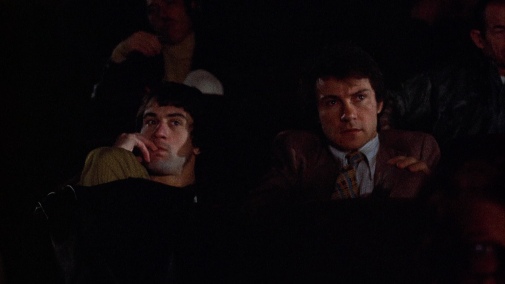
Mean Streets is currently streaming on Tubi. You can also rent and purchase it on Apple TV+, Amazon, Google Play, YouTube, and VUDU.




Reader Comments (4)
Great write-up, and unexpected! Time for a rewatch of this film that altered my teenaged view of cinema and screen acting. I watched Mikey and Nicky for the first time a couple of years ago and wondered if Elaine May had been in some way influenced by Mean Streets.
Uncool opinion but I prefer his performance in Bang The Drum Slowly.
This was Scorsese's third film, not sophomore.
Wae Mest -- Thank you for the note. I completely forgot about BOXCAR BERTHA - shame on me.